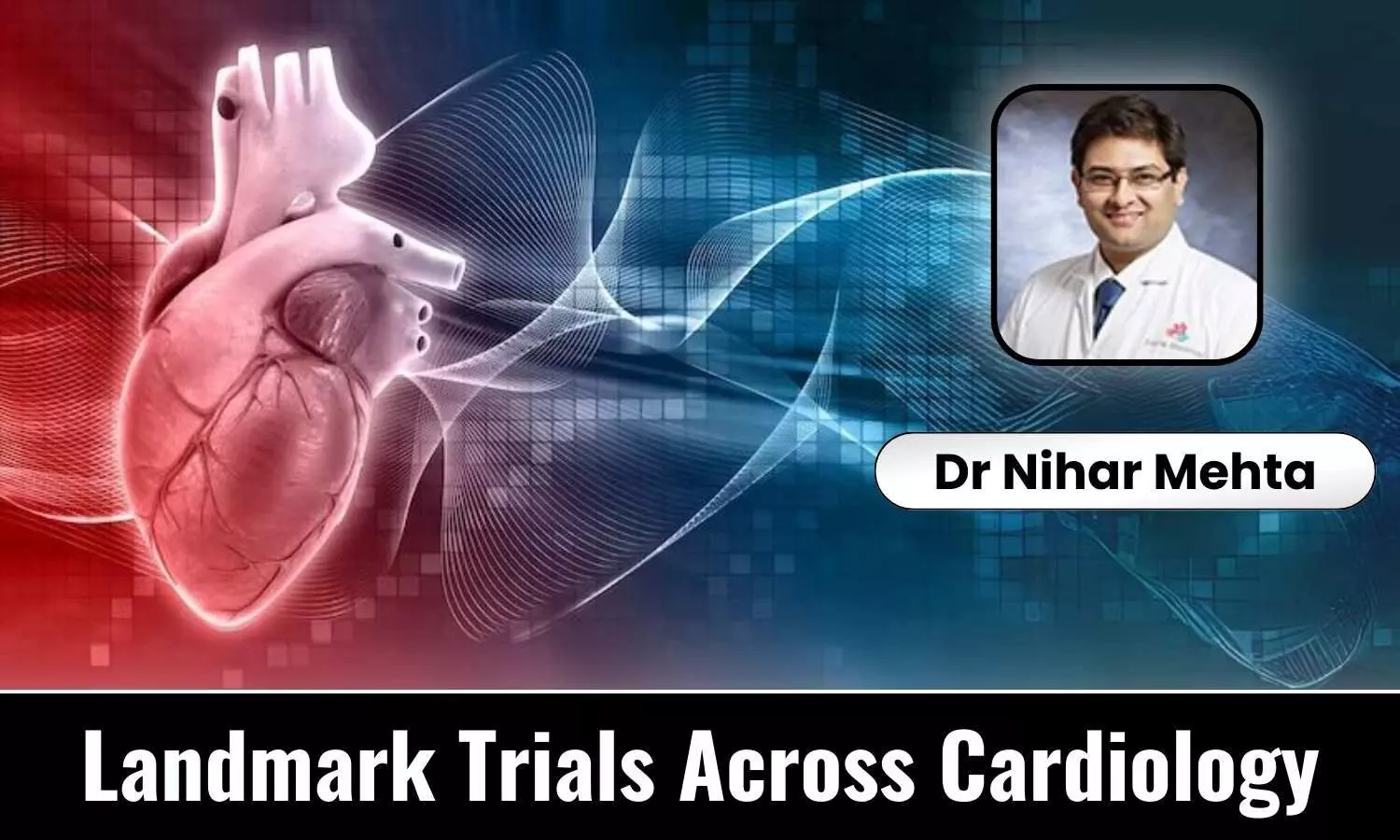- Home
- Medical news & Guidelines
- Anesthesiology
- Cardiology and CTVS
- Critical Care
- Dentistry
- Dermatology
- Diabetes and Endocrinology
- ENT
- Gastroenterology
- Medicine
- Nephrology
- Neurology
- Obstretics-Gynaecology
- Oncology
- Ophthalmology
- Orthopaedics
- Pediatrics-Neonatology
- Psychiatry
- Pulmonology
- Radiology
- Surgery
- Urology
- Laboratory Medicine
- Diet
- Nursing
- Paramedical
- Physiotherapy
- Health news
- AYUSH
- State News
- Andaman and Nicobar Islands
- Andhra Pradesh
- Arunachal Pradesh
- Assam
- Bihar
- Chandigarh
- Chattisgarh
- Dadra and Nagar Haveli
- Daman and Diu
- Delhi
- Goa
- Gujarat
- Haryana
- Himachal Pradesh
- Jammu & Kashmir
- Jharkhand
- Karnataka
- Kerala
- Ladakh
- Lakshadweep
- Madhya Pradesh
- Maharashtra
- Manipur
- Meghalaya
- Mizoram
- Nagaland
- Odisha
- Puducherry
- Punjab
- Rajasthan
- Sikkim
- Tamil Nadu
- Telangana
- Tripura
- Uttar Pradesh
- Uttrakhand
- West Bengal
- Medical Education
- Industry
Top Ten Landmark Trials Across Cardiology - Dr Nihar Mehta

1. Framingham Heart Study (1948):
The inception of modern cardiovascular epidemiology, the Framingham Heart Study, laid the foundation for understanding the risk factors associated with heart disease. It identified hypertension, high cholesterol, smoking, and diabetes as major contributors, guiding preventive strategies globally.
2. HOPE Trial (2000):
The Heart Outcomes Prevention Evaluation trial demonstrated the cardiovascular protective effects of angiotensin-converting enzyme (ACE) inhibitors. This landmark study influenced the use of ACE inhibitors in high-risk patients, emphasizing their role in preventing adverse cardiac events.
3. COURAGE Trial (2007):
Addressing the role of percutaneous coronary intervention (PCI) in stable coronary artery disease, the COURAGE trial challenged conventional wisdom by showing that optimal medical therapy alone was as effective as PCI in reducing major cardiovascular events.
4. TRITON-TIMI 38 (2007) and PLATO (2013):
In the TRITON-TIMI 38 trial, prasugrel exhibited significant efficacy advantages over clopidogrel, notably reducing the primary endpoint of cardiovascular death, MI, or stroke, and decreasing stent thrombosis.
In the PLATO trial, ticagrelor demonstrated superior efficacy over clopidogrel, significantly reducing the composite endpoint of vascular death, myocardial infarction (MI), or stroke.
The study confirmed consistent benefits across diverse patient groups and revealed a favourable safety profile for ticagrelor with no excess in major bleeding events emphasizing its potential as an alternative to clopidogrel in ACS management.
5. RE-LY Trial (2009):
Focused on stroke prevention in atrial fibrillation, the RE-LY trial introduced the novel oral anticoagulant dabigatran. Its findings revolutionized anticoagulation therapy, offering an alternative to traditional warfarin with improved safety and convenience.
6. The JUPITER trial (2012):
Revealed that rosuvastatin significantly reduces major cardiovascular events in apparently healthy individuals with LDL cholesterol <130 mg/dl but high-sensitivity C-reactive protein (hs-CRP) ≥2 mg/L. Despite an increased risk of diabetes in at-risk individuals, there was an overall net benefit, emphasizing the trial's significance.
7. PARADIGM-HF Trial (2014):
Shifting the paradigm in heart failure management, this trial demonstrated the superiority of sacubitril/valsartan over enalapril, heralding a new era in the treatment of heart failure with reduced ejection fraction.
8. The HOPE-3 trial (2016):
Revealed that low-dose statin therapy with rosuvastatin significantly reduces cardiovascular events in intermediate-risk individuals without known cardiovascular disease. Blood pressure lowering alone showed no overall benefit.
Combining cholesterol and blood pressure management demonstrated superior outcomes. The study supports the efficacy of low-dose statins in this population and emphasizes potential benefits of integrated lipid and blood pressure strategies.
9. ODYSSEY Outcomes Trial (2018):
Focused on the use of PCSK9 inhibitors, the ODYSSEY Outcomes trial provided crucial insights into the benefits of these agents in reducing recurrent cardiovascular events, opening new avenues for lipid-lowering therapy.
10. ISCHEMIA Trial (2019):
Examining the role of invasive strategies in managing stable ischemic heart disease, the ISCHEMIA trial questioned the routine use of revascularization procedures, emphasizing the importance of optimal medical therapy in certain patient populations.
11. PARTNER TRIALS:
The PARTNER trials, evaluating transcatheter aortic valve replacement (TAVR) against surgical aortic valve replacement (SAVR), revealed significant findings across risk categories.
In high-risk patients (PARTNER 1 -2010 ), TAVR proved noninferior to SAVR at 1 year, higher vascular complications but comparable 5-year outcomes, TAVI demonstrated improved outcomes, highlighting its efficacy for high-risk patients.
Intermediate-risk patients (PARTNER 2 - 2016) saw TAVR's noninferiority at 2 years, particularly in transfemoral cases, with sustained benefits at 5 years and cost-effectiveness.
For low-risk patients (PARTNER 3 - 2019), TAVR demonstrated superiority at 1 year, maintained over 5 years, showcasing lower stroke rates, reduced atrial fibrillation, and improved quality of life, all with cost-effectiveness. Ongoing research explores long-term implications.
Dr Nihar Mehta (MBBS, MD (Medicine), DNB (Medicine), DNB (Cardiology), Fellowship In Interventional Cardiology & Cardiovascular Imaging (South Korea)) is a Consultant Cardiologist and Associate Director (Department of Structural Heart Diseases) at Jaslok Hospital & Research Centre, Mumbai. He has over 19 years of experience in the field of Cardiology. His areas of expertise include Interventional Cardiology including Angiography, Angioplasty and Stenting, Cardiovascular Imaging, Cardiovascular Research, Transthoracic 2D Echocardiography, Transesophageal Echocardiography, StressTesting and Non-invasive Clinical Cardiology, Hypertension, Dyslipidemia and Preventive Cardiology.



